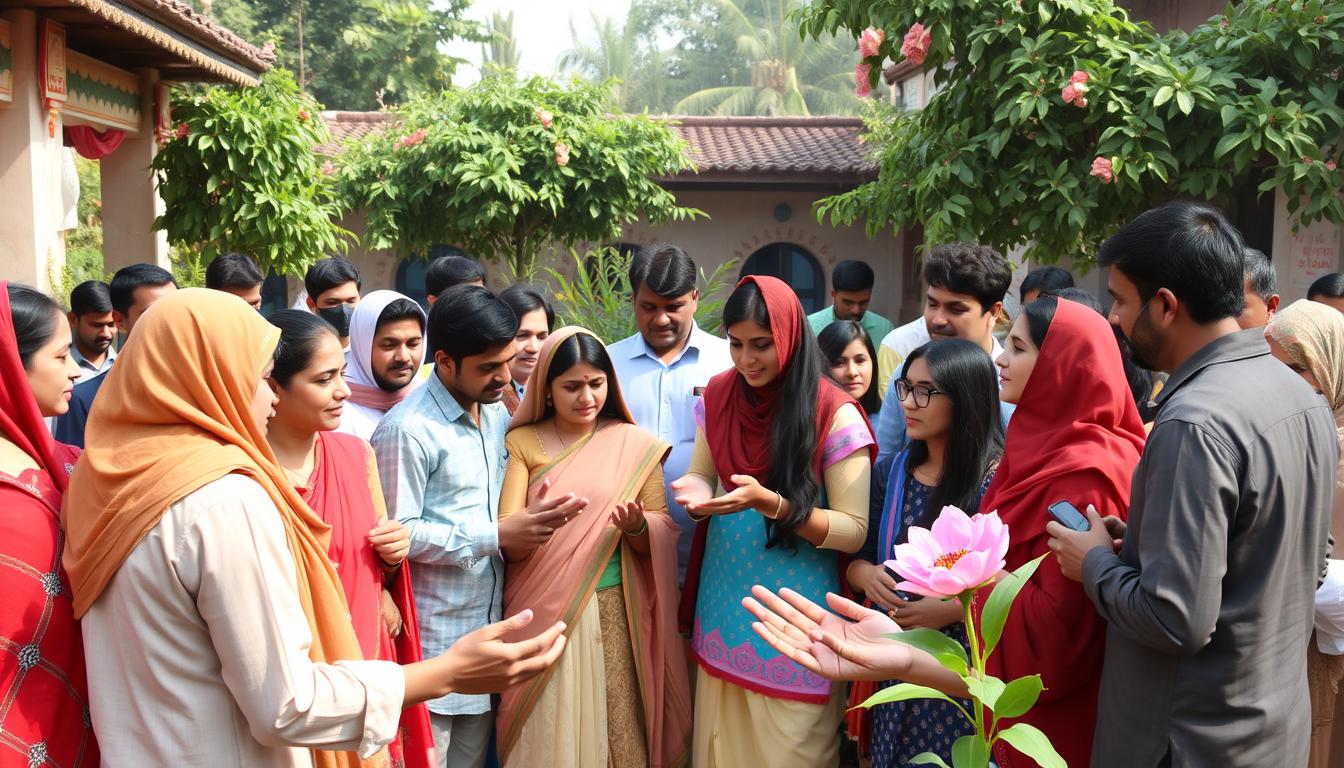The World Health Organization says about 703,000 people die by suicide every year. In Pakistan, with over 206 million people, the situation is worse. The country’s laws make it hard to talk about mental health because they punish those who try to kill themselves.
These laws, like Section 327 of the Criminal Code, can send someone to jail for up to a year. They don’t understand that suicide is often a sign of deep sadness, not a crime. This makes people afraid to ask for help because they fear being punished.
Key Takeaways
- Suicide is a serious mental health issue in Pakistan, with outdated laws criminalizing attempted suicide.
- The stigma surrounding mental illness in Pakistan prevents many from seeking necessary support and treatment.
- Grassroots initiatives are working to empower communities and break the silence around mental health challenges.
- Addressing mental health in Pakistan requires a multi-faceted approach, including addressing cultural barriers and improving access to care.
- Collaboration across sectors is crucial to driving meaningful change and ensuring sustainable mental health programs.
The Pressing Need for Mental Health Support
In Pakistan, mental health has been ignored and shamed for too long. The country is ranked 15th in the world for suicides, with 9.9 suicides per 100,000 people in 2015. This shows we really need better mental health care.
Statistics on Mental Health Challenges in Pakistan
Studies show a huge number of people in Pakistan struggle with mental health. About 50 million Pakistanis face depression and anxiety. These issues hit hard on the elderly, LGBTQI+ folks, refugees, migrants, and prisoners.
Impacts of Stigma and Lack of Access to Care
Stigma makes it hard for people to get help for their mental health. Many see mental health issues as weakness or spiritual imbalance. Also, there aren’t enough affordable mental health services.
We need to tackle the stigma, lack of professionals, and services to help. By doing this, we can support those facing mental health challenges.
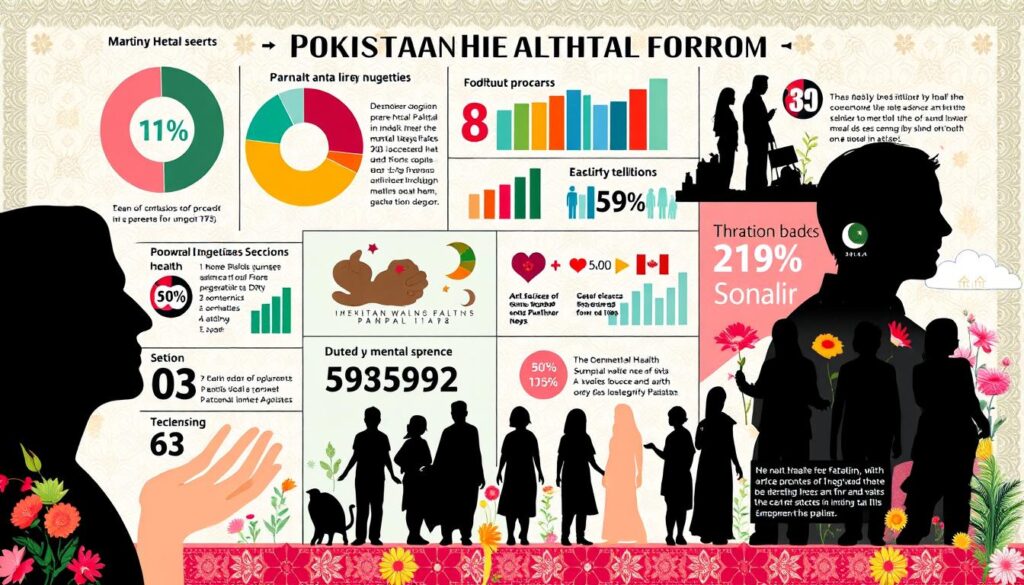
“The stigma surrounding mental health issues in Pakistan often prevents individuals from seeking the help they desperately need.”
Grassroots Organizations Driving Change
In Pakistan, many grassroots groups are leading the way in mental health. They focus on community-based efforts and advocacy. Their work helps those struggling with mental health issues.
Highlighting Local Initiatives and Their Missions
The Suicide Prevention Advocacy Group is a key example. It brings together advocates and organizations like the Association of Psychiatrists in Pakistan. They aim to change laws that punish those who try to kill themselves.
This group uses roundtables, media campaigns, and community outreach. They aim to clear up myths about suicide. Their goal is to help people get support without fear of legal trouble.
Other groups like Rozan and the Sahar Gul Foundation are also making a difference. They offer community services and promote mental health awareness. They empower people to care for their own mental health.
“These grassroots organizations are the driving force behind the change we need to see in Pakistan’s mental health landscape. Their tireless efforts are making a tangible difference in the lives of those affected by mental health challenges.”
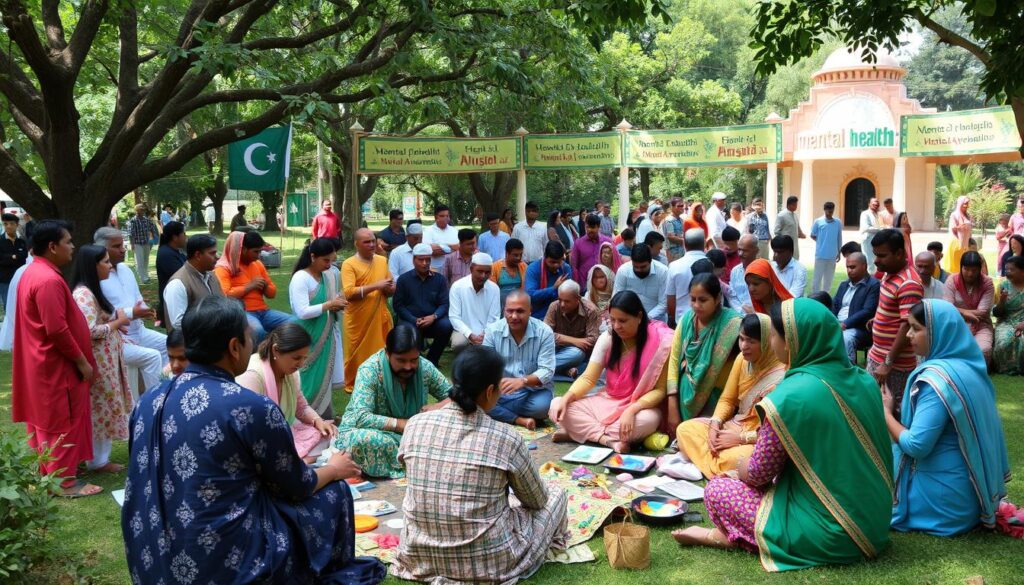
These local groups are changing lives in Pakistan. Their dedication to mental health is truly inspiring. They address the unique needs of their communities.
Mental Health in Pakistan: Breaking the Silence
In Pakistan, mental health issues are often hidden due to stigma and wrong beliefs. Many people are scared to ask for help because of fear of social and legal problems. But, a movement is growing to help change this and offer care to those who need it.
Overcoming Cultural Barriers and Misconceptions
In Pakistan, old beliefs about mental illness are common. Some think it shows weakness or is caused by evil spirits. This lack of understanding and empathy stops many from getting the help they need. Mental health campaigns are key in fighting these myths and starting open talks about mental health.
The “Break the Silence” campaign is a big step in this fight. It wants to make mental health less stigmatized and let people get help without fear. The campaign uses workshops, events, and online efforts to change how Pakistan sees mental health.
Mental health is not just a personal issue, but a public health concern that requires collective action. By breaking the silence, we can create a more compassionate and supportive society for those struggling with mental health challenges.”
– Dr. Amina Ahmed, Founder of the “Break the Silence” campaign
More groups and leaders are speaking out, helping to clear the way. By starting open talks and making resources easy to find, Pakistan’s mental health movement is making progress. It’s working towards a future where mental health is valued and supported.
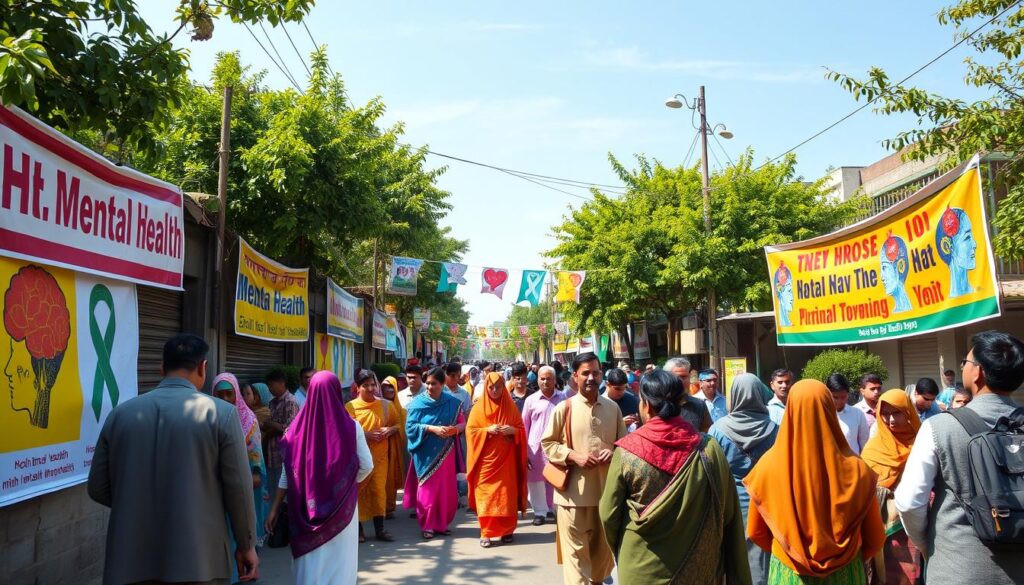
Community Outreach and Awareness Campaigns
In Pakistan, groups like the Mandate Health Empowerment Initiative (MHEI) lead the way in mental health. They work to make people aware and reduce the stigma around mental health issues.
MHEI uses many ways to spread the word. They work with media, social media, and community leaders. This helps to clear up wrong ideas about mental illness and suicide. They want to make it easier for people to talk about mental health.
MHEI also teams up with local health services. This helps more people get the mental health help they need. They want to fix the problem of not enough mental health services in Pakistan.
Empowering Youth through Mental Health Education
MHEI also focuses on teaching young people about mental health. They work with schools and universities. This helps the next generation understand and take care of their mental health.
These programs aim to make mental health less scary. They teach self-care and how to support friends. MHEI wants to make a society where talking about mental health is normal.
| Mental Health Awareness Campaigns in Pakistan | Impact |
|---|---|
| MHEI’s media and social media sensitization campaigns | Reached over 1 million individuals, dispelling myths and promoting understanding |
| Collaboration with traditional, religious, and youth leaders | Increased community engagement and trust in mental health support |
| School-based mental health education programs | Equipped over 10,000 students with knowledge and coping strategies |
The work of groups like MHEI shows the impact of community efforts in Pakistan. They are making a difference by raising awareness and helping people. This creates a better place for those who need mental health support.
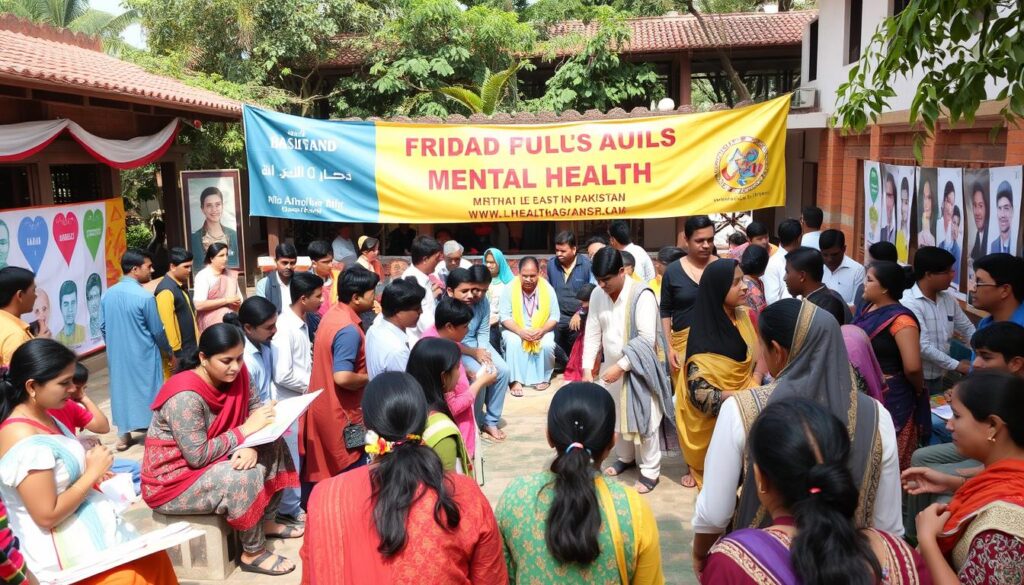
Empowering Youth Through Mental Health Education
Grassroots organizations in Pakistan are tackling mental health issues among the youth. They are launching school-based programs and creating mental health peer support networks. These efforts give students the tools to handle the ups and downs of growing up.
School-Based Mental Health Initiatives
In Pakistan, schools are starting programs to teach mental health. These programs help students learn how to cope and manage their emotions. They also teach students to talk openly about mental health, helping to break down stigmas.
Mental Health Peer Support Networks
Grassroots groups are also setting up mental health support groups for young people. These groups are safe places where students can share their feelings and find support. They help students feel less alone and more empowered to take care of their mental health.
These efforts are helping Pakistani youth develop the skills and strength they need. By focusing on mental health education and support, these initiatives are preparing the next generation to succeed.
“Empowering young people with mental health knowledge and support is essential for building a more resilient and compassionate society. These grassroots initiatives are transforming lives and paving the way for a brighter future.”
The Role of Faith-Based Organizations
In Pakistan, faith-based groups are key in tackling the mental health crisis. They use their influence to help people feel more comfortable talking about mental health. This way, they encourage more people to get the help they need.
Working with religious leaders, these groups add spiritual practices to mental health care. This helps reach out to communities that might not use traditional mental health services.
Leveraging Religious Influence for Mental Health Advocacy
Religious leaders in Pakistan are highly respected. By teaming up with them, mental health efforts can spread awareness and challenge wrong ideas. These leaders can also guide their followers to faith-based mental health services and start open talks on the topic.
“Faith-based organizations have a unique opportunity to bridge the gap between spiritual and mental well-being in Pakistan. By integrating these elements, we can provide a holistic approach to supporting individuals in need.”
Adding spiritual practices like meditation and prayer to mental health care can offer extra support. This method can attract those who prefer a faith-based approach to mental health.
By using faith-based groups and religious influence, grassroots efforts in Pakistan can make a big difference. They can help break the silence around mental health and empower people to seek help. This teamwork tackles the cultural and social issues that have led to the mental health crisis in the country.
Capacity Building and Training Initiatives
Grassroots organizations in Pakistan are working hard to improve mental health support. They are training local leaders, healthcare workers, and community members. This helps them support those facing mental health issues.
They aim to build a network of trained people. These professionals and caregivers can offer mental health services that fit the culture and needs of each area.
Empowering Local Leaders
Organizations in Pakistan are training local leaders to be mental health champions. These programs help community groups, religious leaders, and influential people. They learn to raise awareness, fight stigma, and help people find the right support.
Strengthening Community Mental Health Workers
Training community mental health workers is key. These programs teach people from the community to offer basic mental health services. They learn to spot early signs of trouble and know when to refer someone for more help.
By doing this, organizations make mental health support more available. They focus on meeting the unique needs of each community.
Caregiver Support and Training
Grassroots groups also support caregivers. They offer training and help for family members and caregivers. This helps them understand mental health better and find ways to cope.
These programs aim to create a supportive environment. They help those who need care feel supported and understood.
| Program | Objectives | Target Audience |
|---|---|---|
| Mental Health Leadership Training | Equip community leaders with knowledge and skills to promote mental health advocacy | Community-based organizations, religious leaders, influential figures |
| Community Mental Health Worker Training | Empower individuals from local communities to provide basic mental health services | Community members, volunteers |
| Caregiver Support and Training | Improve caregivers’ understanding of mental health and develop coping strategies | Family members, friends, and other caregivers |
These efforts are vital for Pakistan’s mental health support. They ensure communities have access to trained professionals and caregivers. These people can offer services that are culturally appropriate and easy to reach.
Addressing Mental Health in Marginalized Communities
In Pakistan, some groups face big mental health issues because they are marginalized. The elderly, LGBTQI+ people, refugees, migrants, and prisoners struggle more with depression, anxiety, and thoughts of suicide. Grassroots groups across the country are working hard to help these communities. They offer support that fits their culture and push for policies that make mental health services available to all.
Embracing Diversity is one such group. They help LGBTQI+ individuals in Pakistan, who often face stigma and discrimination. This makes their mental health problems worse. The group offers counseling, support groups, and campaigns to make the community more welcoming.
“Everyone deserves access to quality mental health care, regardless of their social or economic status. We are committed to empowering marginalized communities and breaking down the barriers they face in accessing the support they need.”
Refugee Aid Pakistan also plays a key role. They focus on the mental health of displaced people and families. These individuals have often gone through trauma and loss. The group offers counseling, support groups, and community programs to help them heal.
- Addressing mental health in marginalized communities in Pakistan
- Grassroots organizations supporting LGBTQI+ individuals, refugees, and other vulnerable groups
- Providing culturally-sensitive mental health services and advocating for inclusive policies
Grassroots organizations in Pakistan are making a big difference. They are raising the voices of marginalized communities and fighting for their mental health needs. This is helping create a fairer and more inclusive society where everyone can get the support they need.
Integrating Mental Health into Primary Healthcare
In Pakistan, a growing mental health crisis is being tackled by grassroots groups and advocates. They aim to add mental health services to primary care. This makes mental health support easier to get and helps reduce stigma, especially in rural areas. But, there are many challenges to overcome for this to work fully.
Challenges and Opportunities in the Pakistani Context
One big problem is the lack of mental health experts in Pakistan. According to a report by the World Health Organization, the country has only 0.19 psychiatrists per 100,000 population. This shortage makes it hard to offer full mental health services at primary care.
Also, the healthcare system’s limited resources and funding are major hurdles. Adding mental health to primary care needs special resources, setup, and training for healthcare workers. They need to be able to spot, refer, and help with basic mental health issues.
Yet, there are chances to make integration better. Grassroots groups are working with local officials to train health workers and create mental health programs for primary care centers. These efforts aim to fill the gap and make mental health services more available in hard-to-reach areas.
Also, the growing awareness of mental health’s importance is a key chance. Policymakers and health leaders must focus on adding mental health to primary care. This ensures everyone gets the psychological support they need.
“Integrating mental health into primary care is a crucial step towards addressing the mental health crisis in Pakistan. It has the potential to reach the most marginalized communities and provide much-needed support where it is needed the most.”
Collaboration and Partnership Across Sectors
In Pakistan, tackling the mental health crisis needs a team effort. This includes healthcare, government, civil society, and the private sector. Grassroots groups are at the forefront, working together to share resources and expertise. They aim to make a real difference in mental health care.
These efforts are all about working together. They’re using cross-sector collaboration to support mental health in a better way. By teaming up with public-private partnerships, they’re using everyone’s strengths to get more done.
A multidisciplinary approach to mental health is becoming more common. Groups are combining healthcare pros, social workers, community leaders, and advocates. These mental health advocacy coalitions are speaking louder, pushing for policy changes and more funding.
“Collaboration is the key to tackling the mental health crisis in Pakistan. By uniting our efforts across sectors, we can unlock new possibilities and create lasting, transformative change.”
These grassroots efforts are building strong partnerships. They’re set to have a big impact on Pakistan’s mental health scene. Through teamwork, they’re helping communities, overcoming obstacles, and building a stronger, more caring society.
| Sector | Role in Mental Health Collaboration |
|---|---|
| Healthcare | Providing medical expertise, treatment, and referral services |
| Government | Developing policies, allocating resources, and ensuring access to care |
| Civil Society | Advocating for mental health rights, conducting awareness campaigns, and offering community-based support |
| Private Sector | Providing funding, resources, and corporate social responsibility initiatives |
The Way Forward: Sustaining Grassroots Efforts
Grassroots efforts in Pakistan’s mental health face a big challenge. They need to keep going strong and grow. Getting steady funding, making communities own the programs, and pushing for policy changes are key.
Organizations leading mental health advocacy in Pakistan must keep changing with community needs. They should also work with many partners. This way, they can bring about lasting change that helps people and changes how society views mental health.
It’s also important to reform mental health policies in Pakistan. Advocacy to change old policies and create new ones is vital. This can make mental health a top priority in the country’s healthcare system. It will help get more resources, improve care access, and keep mental health efforts going strong.
- The Pressing Need for Mental Health Support
- Grassroots Organizations Driving Change
- Mental Health in Pakistan: Breaking the Silence
- Community Outreach and Awareness Campaigns
- Empowering Youth Through Mental Health Education
- The Role of Faith-Based Organizations
- Capacity Building and Training Initiatives
- Addressing Mental Health in Marginalized Communities
- Integrating Mental Health into Primary Healthcare
- Collaboration and Partnership Across Sectors
- The Way Forward: Sustaining Grassroots Efforts
